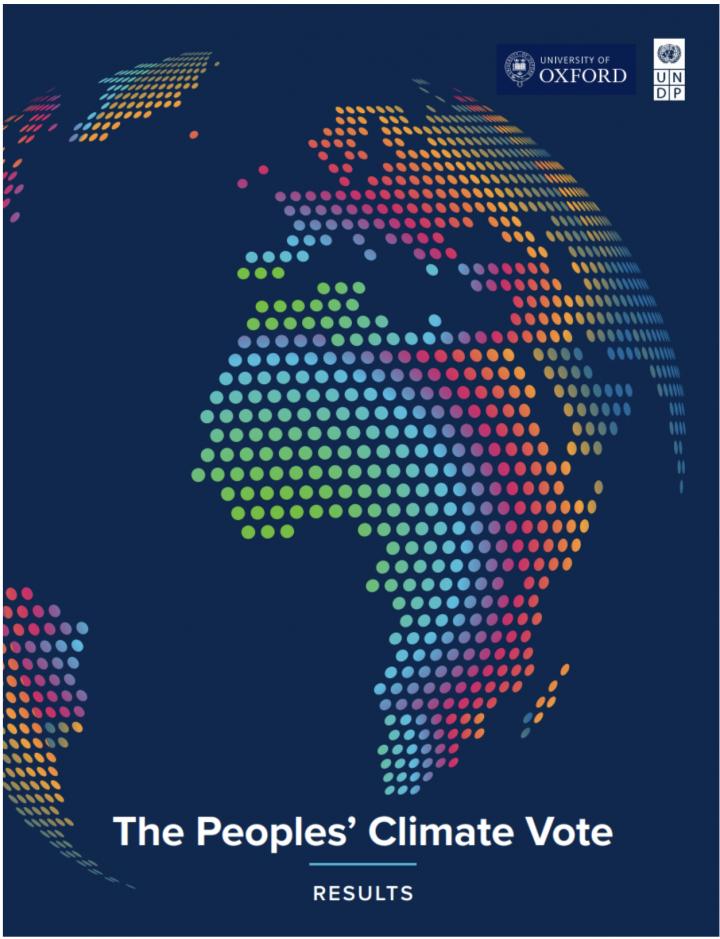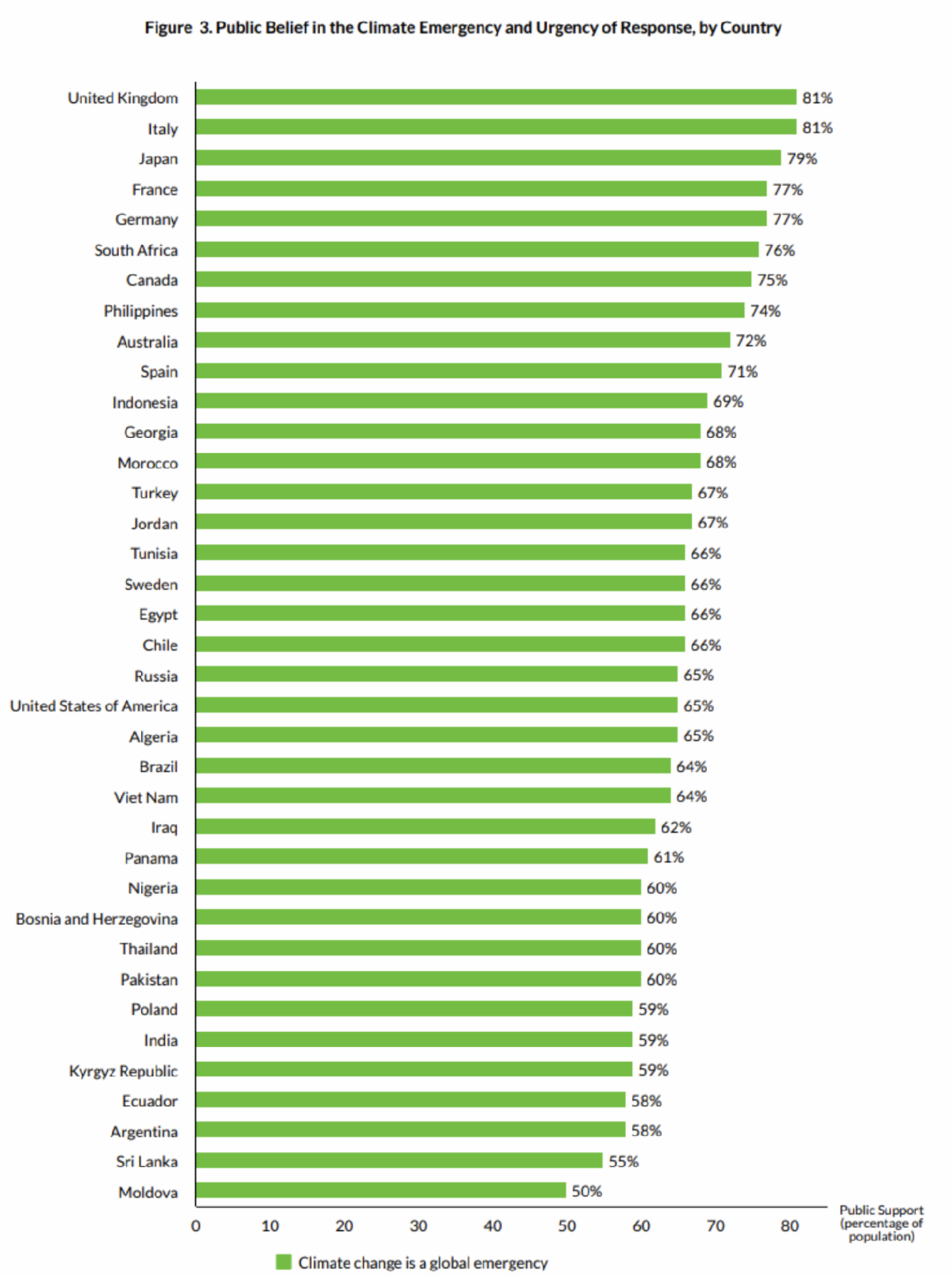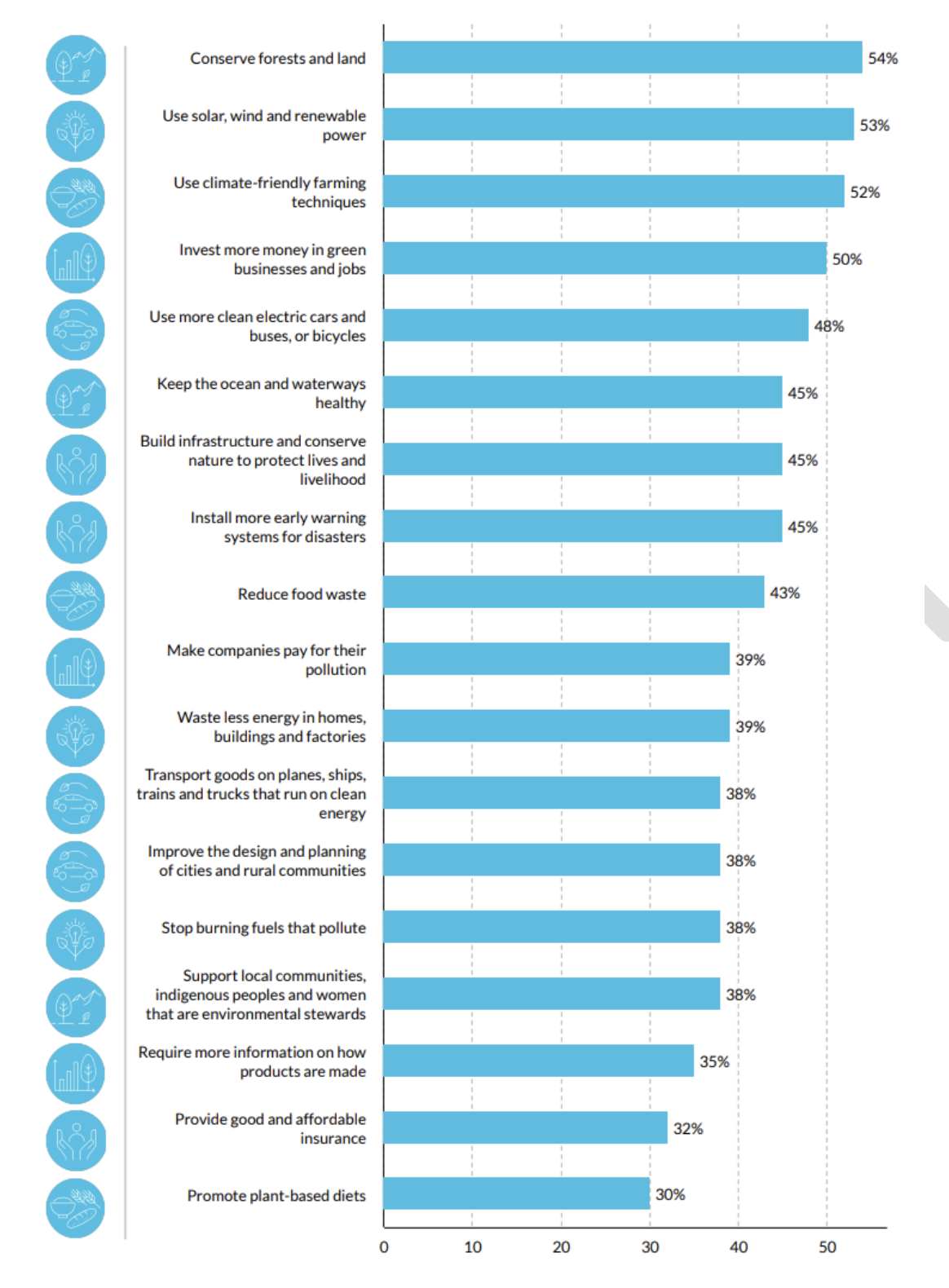There is an overwhelming belief that climate change is a global emergency. This is the conclusion reached by The Peoples’ Climate Vote, the largest survey ever taken of public opinion on climate change recently published by the United Nations Development Programme – UNDP.
50 countries. 17 languages. 1.2 million people.
The results are in of our #PeoplesClimateVote – the largest survey of public opinion on #ClimateChange ever conducted. Read more and explore the findings now: https://t.co/9s64aEletP#Mission1Point5 pic.twitter.com/TDkN7GcIz7
— UN Development (@UNDP) January 27, 2021
“This is an unprecedented moment: even during a COVID-19 pandemic two-thirds of people around the world are seeing climate change as an emergency that must be addressed”, commented Cassie Flynn, the UNDP’s strategic adviser on climate change while illustrating the results of the survey. “The poll cuts across 50 countries in 17 languages. It has a randomized selection of people (over a million people) that represent 56% of the world’s population. We’ve never seen anything at this scale before”.
The survey brings the voice of the people to the forefront of the climate debate. It signals ways in which countries can move forward with public support as we work together to tackle this enormous challenge.
Achim Steiner, Administrator, United Nations Development Programme
Results are analyzed across country groups – high-income, middle-income, Least Developed Countries (LDCs), and Small Island Developing States (SIDS) –, regions, demographics – gender, age, and education levels – , and country-by-country. The survey includes over half a million people under the age of 18, a key constituency on climate change.
Flynn explains that, “ Younger people (under 18 ndr) were more likely to say climate change is an emergency than older people.” This comes as no surprise given the tremendous momentum and leadership whoen by young people in demanding climate action. “Nevertheless, other age groups were not far behind, with 65% of those aged 18-35, 66% aged 36-59, and 58% of those over 60, illustrating how widely held this view has become […] The voices of young people are critically important, because this is their future: they are going to be directly impacted by the decisions that are made on COVID-19 or on climate. So, what we wanted to do was to bring the voices of people in a very meaningful way while asking them ‘How do we solve it? What do you want your government to do?”
Younger people (under 18 ndr) were more likely to say climate change is an emergency than older people.” This comes as no surprise given the tremendous momentum and leadership whoen by young people in demanding climate action. “Nevertheless, other age groups were not far behind, with 65% of those aged 18-35, 66% aged 36-59, and 58% of those over 60, illustrating how widely held this view has become […] The voices of young people are critically important, because this is their future: they are going to be directly impacted by the decisions that are made on COVID-19 or on climate. So, what we wanted to do was to bring the voices of people in a very meaningful way while asking them ‘How do we solve it? What do you want your government to do?”
Detailed results broken down by age, gender, and education level will be shared with governments around the world by the UNDP, which organized the innovative poll in collaboration with the University of Oxford. In many participating countries, it is the first time that large-scale polling on climate change has ever been conducted. 2021 is a pivotal year for countries’ climate action commitments, with a key round of negotiations set to take place at the UN Climate Summit in November in Glasgow, UK.
In the survey, respondents were asked if climate change was a global emergency and whether they supported eighteen key climate policies across six action areas: economy, energy, transport, food & farms, nature, and protecting people.
The Peoples Climate Vote will be able to bridge the gap between people and governments.
Cassie Flynn, the UNDP’s strategic adviser on climate change
“The results of the survey clearly illustrate that urgent climate action has broad support amongst people around the globe, across nationalities, age, gender and education level,” UNDP Administrator Achim Steiner said. “But more than that, the poll reveals how people want their policymakers to tackle the crisis. From climate-friendly farming to protecting nature and investing in a green recovery from COVID-19, the survey brings the voice of the people to the forefront of the climate debate. It signals ways in which countries can move forward with public support as we work together to tackle this enormous challenge.”
The level of recognition of the climate emergency was very high in Italy (81%), the joint highest in the world alongside the United Kingdom, followed by Japan (79%), France and Germany (77%); the US and Russia were at 65% and India was at 59%. The lowest level of support was found in Moldova (50%).
People in Italy were the most engaged in action on climate change of all countries. Of the Italian respondents who said they thought climate change is a global emergency, 78% said the world should do everything possible, urgently, to address it, the highest in the world. By way of comparisons, in Poland only 57% gave the same response.
In Italy, young people (under 18) were also more likely (86%) to believe climate change is an emergency than other age groups, but a substantial majority (70%) of older people (over 60) still agreed with them. Globally these figures were 69% and 58% respectively.
In the survey, there are poll results for public support for key climate policies across six sectors – energy, economy, transportation, farms and food, protecting people, and nature. 64% of people in Italy backed more investment in green businesses and jobs, along with most of the G20 countries in the survey. The average across all 50 countries in the survey was 50%.
It is a moment of choice. It is a fork in the road, and the poll clearly shows what people are thinking while highlighting specific policy choices.
Cassie Flynn, the UNDP’s strategic adviser on climate change
The proportion of people who said climate change is a global emergency was also high at a regional scale: in Western Europe and North America (72%), Eastern Europe and Central Asia (65%), Arab States (64%), Latin America and Caribbean (63%), Asia and Pacific (63%), and Sub-Saharan Africa (61%).
Results show that people often want broad climate policies beyond the current state of play. For example, in eight of the ten survey countries with the highest emissions from the power sector, majorities backed more renewable energy, including the United States (65%) – the biggest emitter surveyed – as well as Australia (76%), Canada (73%), Germany (71%), South Africa (69%), Japan (68%), Poland (57%), and Russia (51%). In four out of the five countries with the highest emissions from land-use change and enough data on policy preferences, there was majority support for conserving forests and land, including Brazil (60%), Indonesia (57%) and Argentina (57%). Nine out of ten of the countries with the most urbanized populations backed more use of clean electric cars and buses or bicycles.
Source: UNDP
Policies had wide-ranging support, with the most popular being conserving forests and land (54% public support), more solar, wind, and renewable power (53%), adopting climate-friendly farming techniques (52%), and investing more in green businesses and jobs (50%). “Such diversity”, explains Flynn, “reflects that people are well aware of the fact that the climate crisis demands a holistic approach to be solved.”
“People believe that there is a climate emergency, no matter where you are from, no matter what age you are, no matter what your gender is. It is a moment of choice. It is a fork in the road, and the poll clearly shows what people are thinking while highlighting specific policy choices,” Flynn adds. “Even people that answered ‘no’ on ‘do you think that there is a climate emergency?’, they still went on to pick a number of different policies that they wanted their government to enact on climate change. People are thinking about how they want to envision their future, they are thinking about what their governments need to do to improve society and lives, and even if it might not be tagged with climate change, there is a real appetite to make some of these changes, e.g. a real appetite for protecting forests and oceans, for conserving nature, for sustainable farming.”
Source: UNDP
The more educated you are, the more likely you are to believe that there is a climate emergency: the survey clearly shows a direct link between a person’s level of education and their desire for climate action. There was very high recognition of the climate emergency among those who had attended university or college in all countries, from lower-income countries such as Bhutan (82%) and the Democratic Republic of the Congo (82%) to wealthy countries like France (87%) and Japan (82%).
The innovative survey was distributed across mobile gaming networks in order to include hard-to-reach audiences in traditional polling, like young people under the age of 18.
Prof Stephen Fisher from the Department of Sociology at the University of Oxford claims that: “The Peoples’ Climate Vote has delivered a treasure trove of data on public opinion that we’ve never seen before. Recognition of the climate emergency is much more widespread than previously thought. We’ve also found that most people clearly want a strong and wide-raging policy response.”
“The survey will help leaders of those countries participating in the poll to feel that the people are with them as they are making the ambitious policy choices needed to address the climate crisis,” explains Flynn while underlining how The Peoples’ Climate Vote will be able to bridge people with governments. “What we are really trying to focus on as a phase 2 of this survey is how we can bring as many voices to the table as possible, including for example people in rural areas, or countries where maybe the bandwidth isn’t strong. This was a very out-of-the-box way of doing a global poll, a very unconventional way of thinking about how we can help people to inform climate policy, and we’re certainly working very closely with our partners to continue to revise and refine it so that it can be as impactful as possible.”
Read and download the survey The Peoples Climate Vote








